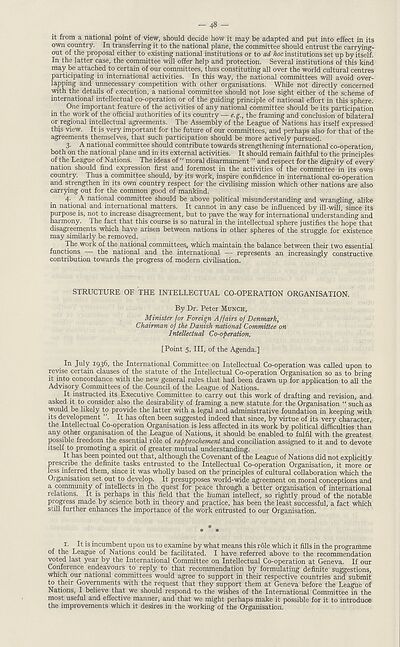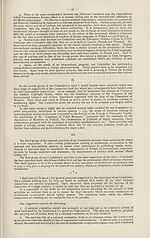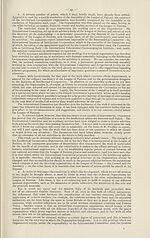International > Proceedings of the second General conference of national committees on intellectual co-operation, Paris, July 5th-9th, 1937
(50)
Download files
Complete book:
Individual page:
Thumbnail gallery: Grid view | List view

-— 48 —
it from a national point of view, should decide how it may be adapted and put into effect in its
own country. In transferring it to the national plane, the committee should entrust the carrying-
out of the proposal either to existing national institutions or to ad hoc institutions set up by itself.
In the latter case, the committee will offer help and protection. Several institutions of this kind
may be attached to certain of our committees, thus constituting all over the world cultural centres
participating in international activities. In this way, the national committees will avoid over¬
lapping and unnecessary competition with other organisations. While not directly concerned
with the details of execution, a national committee should not lose sight either of the scheme of
international intellectual co-operation or of the guiding principle of national effort in this sphere.
One important feature of the activities of any national committee should be its participation
in the work of the official authorities of its country — e.g., the framing and conclusion of bilateral
or regional intellectual agreements. The Assembly of the League of Nations has itself expressed
this view. It is very important for the future of our committees, and perhaps also for that of the
agreements themselves, that such participation should be more actively pursued.
3. A national committee should contribute towards strengthening international co-operation,
both on the national plane and in its external activities. It should remain faithful to the principles
of the League of Nations. The ideas of “ moral disarmament ” and respect for the dignity of every
nation should find expression first and foremost in the activities of the committee in its own
country. Thus a committee should, by its work, inspire confidence in international co-operation
and strengthen in its own country respect for the civilising mission which other nations are also
carrying out for the common good of mankind.
4. A national committee should be above political misunderstanding and wrangling, alike
in national and international matters. It cannot in any case be influenced by ill-will, since its
purpose is, not to increase disagreement, but to pave the way for international understanding and
harmony. The fact that this course is so natural in the intellectual sphere justifies the hope that
disagreements which have arisen between nations in other spheres of the struggle for existence
may similarly be removed.
The work of the national committees, which maintain the balance between their two essential
functions the national and the international — represents an increasingly constructive
contribution towards the progress of modern civilisation.
STRUCTURE OF THE INTELLECTUAL CO-OPERATION ORGANISATION.
By Dr. Peter Munch,
Minister for Foreign Affairs of Denmark,
Chairman of the Danish national Committee on
Intellectual Co-operation.
[Point 5, III, of the Agenda.]
In July 1936, the International Committee on Intellectual Co-operation was called upon to
revise certain clauses of the statute of the Intellectual Co-operation Organisation so as to bring
it into concordance with the new general rules that had been drawn up for application to all the
Advisory Committees of the Council of the League of Nations.
It instructed its Executive Committee to carry out this work of drafting and revision, and
asked it to consider also the desirability of framing a new statute for the Organisation “ such as
would be likely to provide the latter with a legal and administrative foundation in keeping with
its development ”. It has often been suggested indeed that since, by virtue of its very character,
the Intellectual Co-operation Organisation is less affected in its work by political difficulties than
any other organisation of the League of Nations, it should be enabled to fulfil with the greatest
possible freedom the essential role of rapprochement and conciliation assigned to it and to devote
itself to promoting a spirit of greater mutual understanding.
It has been pointed out that, although the Covenant of the League of Nations did not explicitly
prescribe the definite tasks entrusted to the Intellectual Co-operation Organisation, it more or
less inferred them, since it was wholly based on the principles of cultural collaboration which the
Organisation set out to develop. It presupposes world-wide agreement on moral conceptions and
a community of intellects in the quest for peace through a better organisation of international
relations. It is perhaps in this field that the human intellect, so rightly proud of the notable
progress made by science both in theory and practice, has been the least successful, a fact which
still further enhances the importance of the work entrusted to our Organisation.
*
* *
1. It is incumbent upon us to examine by what means this role which it fills in the programme
of the League of Nations could be facilitated. I have referred above to the recommendation
voted last year by the International Committee on Intellectual Co-operation at Geneva. If our
Conference endeavours to reply to that recommendation by formulating definite suggestions,
which our national committees would agree to support in their respective countries and submit
to their Governments with the request that they support them at Geneva before the League of
Nations, I believe that we should respond to the wishes of the International Committee in the
most useful and effective manner, and that we might perhaps make it possible for it to introduce
the improvements which it desires in the working of the Organisation.
it from a national point of view, should decide how it may be adapted and put into effect in its
own country. In transferring it to the national plane, the committee should entrust the carrying-
out of the proposal either to existing national institutions or to ad hoc institutions set up by itself.
In the latter case, the committee will offer help and protection. Several institutions of this kind
may be attached to certain of our committees, thus constituting all over the world cultural centres
participating in international activities. In this way, the national committees will avoid over¬
lapping and unnecessary competition with other organisations. While not directly concerned
with the details of execution, a national committee should not lose sight either of the scheme of
international intellectual co-operation or of the guiding principle of national effort in this sphere.
One important feature of the activities of any national committee should be its participation
in the work of the official authorities of its country — e.g., the framing and conclusion of bilateral
or regional intellectual agreements. The Assembly of the League of Nations has itself expressed
this view. It is very important for the future of our committees, and perhaps also for that of the
agreements themselves, that such participation should be more actively pursued.
3. A national committee should contribute towards strengthening international co-operation,
both on the national plane and in its external activities. It should remain faithful to the principles
of the League of Nations. The ideas of “ moral disarmament ” and respect for the dignity of every
nation should find expression first and foremost in the activities of the committee in its own
country. Thus a committee should, by its work, inspire confidence in international co-operation
and strengthen in its own country respect for the civilising mission which other nations are also
carrying out for the common good of mankind.
4. A national committee should be above political misunderstanding and wrangling, alike
in national and international matters. It cannot in any case be influenced by ill-will, since its
purpose is, not to increase disagreement, but to pave the way for international understanding and
harmony. The fact that this course is so natural in the intellectual sphere justifies the hope that
disagreements which have arisen between nations in other spheres of the struggle for existence
may similarly be removed.
The work of the national committees, which maintain the balance between their two essential
functions the national and the international — represents an increasingly constructive
contribution towards the progress of modern civilisation.
STRUCTURE OF THE INTELLECTUAL CO-OPERATION ORGANISATION.
By Dr. Peter Munch,
Minister for Foreign Affairs of Denmark,
Chairman of the Danish national Committee on
Intellectual Co-operation.
[Point 5, III, of the Agenda.]
In July 1936, the International Committee on Intellectual Co-operation was called upon to
revise certain clauses of the statute of the Intellectual Co-operation Organisation so as to bring
it into concordance with the new general rules that had been drawn up for application to all the
Advisory Committees of the Council of the League of Nations.
It instructed its Executive Committee to carry out this work of drafting and revision, and
asked it to consider also the desirability of framing a new statute for the Organisation “ such as
would be likely to provide the latter with a legal and administrative foundation in keeping with
its development ”. It has often been suggested indeed that since, by virtue of its very character,
the Intellectual Co-operation Organisation is less affected in its work by political difficulties than
any other organisation of the League of Nations, it should be enabled to fulfil with the greatest
possible freedom the essential role of rapprochement and conciliation assigned to it and to devote
itself to promoting a spirit of greater mutual understanding.
It has been pointed out that, although the Covenant of the League of Nations did not explicitly
prescribe the definite tasks entrusted to the Intellectual Co-operation Organisation, it more or
less inferred them, since it was wholly based on the principles of cultural collaboration which the
Organisation set out to develop. It presupposes world-wide agreement on moral conceptions and
a community of intellects in the quest for peace through a better organisation of international
relations. It is perhaps in this field that the human intellect, so rightly proud of the notable
progress made by science both in theory and practice, has been the least successful, a fact which
still further enhances the importance of the work entrusted to our Organisation.
*
* *
1. It is incumbent upon us to examine by what means this role which it fills in the programme
of the League of Nations could be facilitated. I have referred above to the recommendation
voted last year by the International Committee on Intellectual Co-operation at Geneva. If our
Conference endeavours to reply to that recommendation by formulating definite suggestions,
which our national committees would agree to support in their respective countries and submit
to their Governments with the request that they support them at Geneva before the League of
Nations, I believe that we should respond to the wishes of the International Committee in the
most useful and effective manner, and that we might perhaps make it possible for it to introduce
the improvements which it desires in the working of the Organisation.
Set display mode to:
![]() Universal Viewer |
Universal Viewer | ![]() Mirador |
Large image | Transcription
Mirador |
Large image | Transcription
Images and transcriptions on this page, including medium image downloads, may be used under the Creative Commons Attribution 4.0 International Licence unless otherwise stated. ![]()
| League of Nations > International > Proceedings of the second General conference of national committees on intellectual co-operation, Paris, July 5th-9th, 1937 > (50) |
|---|
| Permanent URL | https://digital.nls.uk/195217825 |
|---|
| Shelfmark | LN.XII |
|---|
| Description | Over 1,200 documents from the non-political organs of the League of Nations that dealt with health, disarmament, economic and financial matters for the duration of the League (1919-1945). Also online are statistical bulletins, essential facts, and an overview of the League by the first Secretary General, Sir Eric Drummond. These items are part of the Official Publications collection at the National Library of Scotland. |
|---|---|
| Additional NLS resources: |
|

